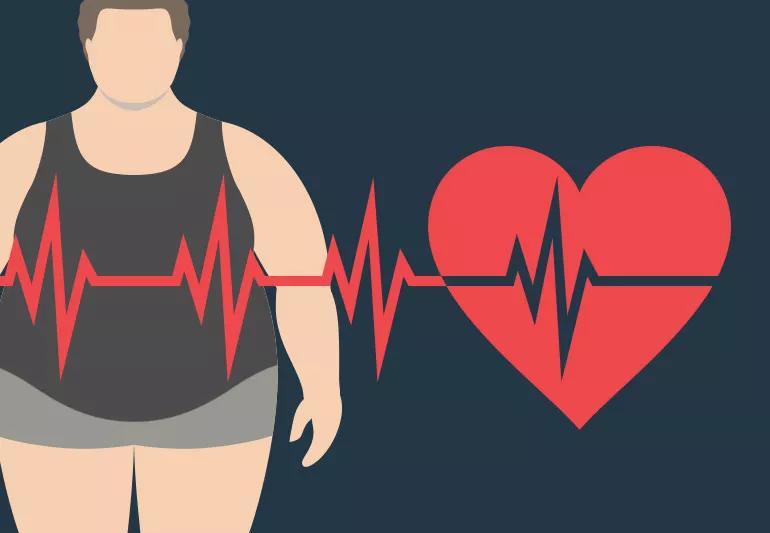Cleveland Clinic study used data of 880,000+ participants

Image content: This image is available to view online.
View image online (https://assets.clevelandclinic.org/transform/d16c16a4-00ea-405f-ad14-6c3706d7513f/obesityDiabCardioDisease-861999778-770x553_jpg)
Illustration of an obese man and a heart rhythm line
A Cleveland Clinic genetic analysis has found that obesity itself, not just the adverse health effects associated with it, significantly increases the risk of type 2 diabetes and coronary artery disease. The paper was published today in the Journal of the American Medical Association Network Open.
Advertisement
Cleveland Clinic is a non-profit academic medical center. Advertising on our site helps support our mission. We do not endorse non-Cleveland Clinic products or services. Policy
Coronary artery disease — and complications that arise from it, such as heart attacks and heart failure — is the leading cause of the death in the United States and across the world. While other factors such as high cholesterol have been tied to coronary artery disease, the association between obesity and cardiovascular disease has not been clearly established.
For this study, researchers performed a meta-analysis of five studies with more than 880,000 participants. Researchers examined participants’ genetic variations using a method called Mendelian randomization, which offers insight into the relationships between health risks and health outcomes. By relying on genetic data, this method removes confounding, or outside, variables that can extraneously influence outcomes, such as smoking, high blood pressure or elevated cholesterol. Mendelian randomization cannot prove causality, but it can be suggestive of a causal association — as was the case in this study.
“This study is important because we can conclude that it is not solely factors like high blood pressure, high cholesterol or lack of exercise that tend to come with obesity that are harmful — the excess fat itself is harmful,” explains study senior author and preventive cardiologist Haitham Ahmed, MD. “Patients may think their cardiovascular risk is mitigated if their other risk factors are normal or being treated, but this study suggests you cannot ignore the extra weight. Physicians should take heed and make sure they are counseling their patients about weight loss in a comprehensive and collaborative manner.”
Advertisement
The study showed that each five-point rise in BMI, for example from a BMI of 25 to a BMI of 30, increased the odds of Type 2 diabetes by 67% and coronary artery disease by 20%. In light of the Mendelian randomization, these increases are thought to be independent of traditional risk factors. This means the risks hold true even if the patient has, for example, normal cholesterol, blood pressure and blood sugar. Three of the studies analyzed also included stroke as a clinical outcome, but the researchers did not find a significant association between obesity and all-cause stroke.
“It is very important to recognize that while lifestyle factors certainly contribute to obesity, obesity is not simply a lifestyle choice. It is a disease, and there is large genetic influence on your weight,” Dr. Ahmed says. “Our data show that nearly 100 genetic variations influence the development of obesity and subsequently increase your risk of heart disease.”
According to the CDC, 39.8% of U.S. adults have obesity. Meanwhile, the World Health Organization reports 13% of the world’s adult population has obesity and that the prevalence of obesity has tripled between 1975 and 2016. Obesity rates, along with rates of cardiovascular disease and diabetes, are expected to continue to rise, if current trends continue.
Advertisement

Sign up for our Health Essentials emails for expert guidance on nutrition, fitness, sleep, skin care and more.
Learn more about our editorial process.
Advertisement
Surgery (but not stenting) protects those with stable coronary disease
Type 1 diabetes happens when your body doesn’t make insulin, while Type 2 happens when your body can’t use insulin properly
Gastric bypass and sleeve gastrectomy are different procedures that offer similar benefits, including significant weight loss
This diabetes drug is quickly gaining attention for weight loss potential
Updated food label guidelines make it easier to track added sugars in your diet
This diabetes med can treat obesity, but it’s not for people who just want to drop a few pounds
They’re legit health conditions, and not entirely in your control
Your weight-loss plateau isn’t a question of willpower, it’s your body fighting back
Type 2 diabetes isn’t inevitable with these dietary changes
Applying a hot or cold compress can help with pain
Pump up your iron intake with foods like tuna, tofu and turkey